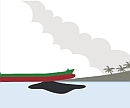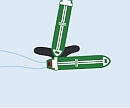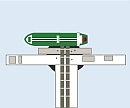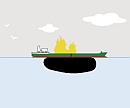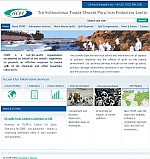Supplement 2.7: Accidental Oil Discharges at Sea
According to insurers' statistics 80% of oil tanker accidents which cause oil spills at sea are a result of human errors:
- badly handled manoeuvres,
- neglected maintenance,
- insufficient checking of systems,
- lack of communication between crew members,
- fatigue,
- or an inadequate response to a minor incident causing it to escalate into a major accident.
(Cedre 2007: 31)
The figure below illustrates the causes of oil tanker accidents with spills over 700 tonnes between 1974 and 2007 (data source: ITOPF 2008; image source: Cedre 2007: 32).

Other/unknown: 7%
|
Collisions are generally due to manoeuvring errors, especially in poor visibility and/or busy shipping traffic areas. Groundings are also often a result of manoeuvring errors, often made worse by high winds, challenging currents and bad weather. The grounding of the Sea Empress at the entrance to Milford Haven port, Wales (Great Britain) is one such example.
However, equipment failure is a more common cause of groundings than of collisions. The grounding of the oil tanker the Braer in the Shetland Islands, Scotland (Great Britain), resulting from seawater entering into a fuel tank, causing engine failure, is a classic example of technical failure.
Oil tanker spills
The International Tanker Owners Pollution Federation Ltd (ITOPF) keeps an up-to-date database on the Internet (see below) on oil spills of over 700 tonnes, from oil tankers, ore carriers and tank barges which have occurred all over the world since 1967. Information is also provided on various aspects of the spills and their consequences.
This data brings to light the fact that a little more than 5.5 million tonnes of oil were spilled in the world's seas by oil tanker accidents during the 30 year period from 1970-2000, totalling nearly 182,000 tonnes per year with a peak of 640,000 tonnes in 1979.
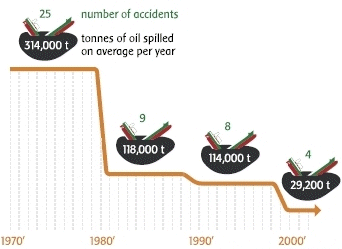
Source: Cedre 2007, 31; data source: ITOPF, 2004
Since then, despite a bad year in 1991, the tendency is towards a considerable decrease. In the decade from 1990 to 1999, 73% (830,000 tonnes) of the total amount spilled (1,140,000) was caused by only 10 accidents.
More information
ITOPF is a mutual organisation providing technical advice on pollution response for shipowners of oil tankers. ITOPF experts contribute to response operation management, impact assessment and environmental restoration operations around the world. See below the home page of ITOPF's website, which is an indispensable source of information on accidents, their causes and response carried out. For further information, see www.itopf.com
